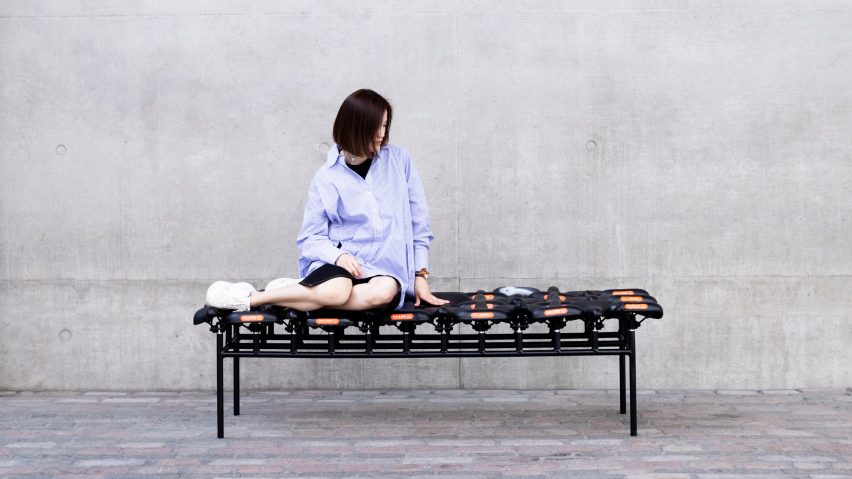Central Saint Martins graduate Qiang Huang has created a range of unfinished furniture bases that need to be completed by adding components from discarded shared bikes.
Named Bike Scavengers, Huang's furniture is designed to be used by an association that would encourage participants to disassemble bikes left on the street and transform the salvaged parts into usable products.
The association would provide unfinished elements that would require different bike components to create items of furniture including a bench, a stool, a trolley and a lamp.
She developed the system to tackle the huge amount of waste that is likely to result from these discarded bikes by proposing a system for salvaging and reusing components to create statement furniture.
Huang's project is a response to the explosion of cycle-sharing schemes in urban centres around the world. In China alone around 20 million shared bikes are currently operated by more than 60 companies.
"At the heart of the project is a critique of the environmental detriment caused by bike-sharing schemes in their operations and unregulated growth in China," said Huang.
"Presenting what a bike-made product looks like gives an opportunity to our users to be upcycling practitioners and to take social responsibility."
The collection includes a Bench of Saddles featuring a metal frame with rows of vertical fixings for attaching 36 discarded saddles. The interlocking saddles form a single seating surface with a repetitive pattern that the designer said "refers to the over-production of shared bikes".
Other items include lamps made from salvaged mudguards, a stool featuring six saddles attached to a stem-like base, and a kitchen trolley created by fixing bike baskets to a simple frame with wheels.
"These products could not only be functional commodities but also provocative pieces reminding people how bike sharing affected us and in what way we could protect our living environment and future," the designer suggested.
Huang added that an important part of the project would involve overcoming the negative connotations of the word "scavenger" and instead celebrating the work of people who perform the role of repurposing these overproduced and disused bikes.
Chinese bike-sharing company Mobike recently announced plans to withdraw its fleet of dockless bikes from Manchester, England, following unsustainable levels of theft and vandalism.
The same company has also developed an electric version of its signature orange bicycle, and French company Zoov has also developed a system of electric sharing bikes that lock together.

